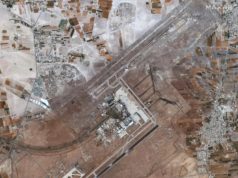The UN Security Council for the third time started working on a draft resolution on Syria this week as Syrian forces continue to bombard opposition strongholds. “We hope Russia and China will not oppose the proposed resolution,” French Foreign Ministry spokesman Bernard Valero said.
But as of now, Syria’s two allies in the Security Council have yet to show signs they will back any resolution with substance. Over the weekend, Syrians voted in a referendum on changes to the country’s constitution, ridiculed by the opposition as a “window dressing.” According to the Syrian government, the vote received 89.4 percent approval from more than eight million voters, or close to 60 percent of the population — although diplomats say they witnessed only a few voters at Damascus polling stations. The new constitution is supposed to lead to multi-party elections within three months and allows President Bashar al-Asad to remain in power until 2028.

A damaged building, from shelling by the Syrian Army, in the city of Idlib. |
Tellingly, Russia and China congratulated the referendum as a step towards reform.
Meanwhile, the international community opposed to Asad’s rule is publicly debating whether or not to arm Syria’s rebels. On Friday, at an inaugural meeting in Tunisia of an international anti-Asad group, the Friends of Syria, Saudi Arabian Foreign Minister Prince Saud al-Faisal said that arming the Free Syria Army is an “excellent idea.” But in an interview with CBS News, Secretary of State Hillary Clinton explained her concerns about arming the opposition, including the fear that weapons may end up in al-Qaeda’s hands. Previously, Clinton said the rebels “will from somewhere, somehow, find the means to defend themselves” and that “there will be a breaking point.”
That’s a pretty optimistic outlook, considering the situation, and it raises certain questions. By arming or aiding the rebels, the Obama administration can work to ensure it has leverage over the opposition in a post-Asad Syria, and that al-Qaeda doesn’t gain possession of weapons or a foothold in the strategically placed country. Indeed, if the arming of rebels and a breaking point is inevitable, as Ms. Clinton surmised, doesn’t the Obama administration want to engage and assist the opposition to hopefully influence Syria’s future?





